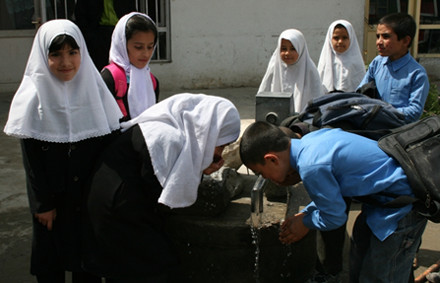KABUL - Mustafa, aged nine, has to go home to relieve himself because the only toilet in Ilhaqya-e-Anwar Bismel primary school in Kabul has been closed for over three months.

Diarrhoea, caused by contaminated food or drinking water, kills about 67,500 Afghan children every year, according to the UN Children’s Fund (UNICEF).
“We either go home or relieve ourselves wherever we can outside the school,” said Mustafa.
“We had a toilet but it has been clogged for some time,” said Aisha, a teacher, adding that the children had to use toilets in a nearby school or go home.
Drinking water was only available from a lidless container placed in the open, and there were no handwashing facilities in the school, where over 4,000 students, grades 1-3, are enrolled.
Hygiene and sanitation facilities are poor in all schools in Afghanistan, but the overall condition of schools in Kabul is far better than in rural areas.
There are about 12,600 government schools countrywide with over seven million students, about 35 percent of them girls. About half the schools (6,500), mostly in rural areas, do not have a building (classes are held in the open or in tents), according to the Ministry of Education.
“If schools don’t have buildings or classrooms, how can there be toilets and safe drinking water facilities?” asked Education Ministry spokesman Gul Agha Ahmadi.
Diarrhoea
Diarrhoea, caused by contaminated food or drinking water, kills about 67,500 Afghan children every year, according to the UN Children’s Fund (UNICEF).
In Afghanistan, “diarrhoea and waterborne diseases are common due to low coverage of safe drinking water and sanitation facilities,” said Nadarajah Moorthy, a water, sanitation and hygiene expert with UNICEF in Afghanistan.
Only 18 percent of the rural population has access to protected water sources (boreholes, hand-pumps or piped water systems) and only one in 10 families has and uses sanitary toilets.
Handwashing saves lives
Millions of children around the world will wash their hands with soap on 15 October, Global Handwashing Day, in a symbolic gesture to highlight the importance of handwashing in preventing death and disease among children.
No school in Afghanistan provides soap but on 16 October students in 1,700 schools in different parts of the country will mark the day with free soap donated by UNICEF, Education Ministry officials said.
“How much will it cost to procure soap for over seven million students in one day, in one month and in one year?” said Ministry spokesman Ahmadi, adding that the government did not have the resources to ensure appropriate sanitation facilities at schools.
“Hand washing with soap at critical times - including before eating or preparing food and after using the toilet - can reduce diarrhoea rates by more than 40 percent,” said UNICEF’s Moorthy.
UNICEF says it promotes handwashing with soap, and invests US$5 million every year in water and sanitation facilities at schools in Afghanistan.
“Everybody knows it is good to wash hands with soap but the question is whether soap and water are available to everyone,” said Aisha, the teacher at Bismel primary school in Kabul.



